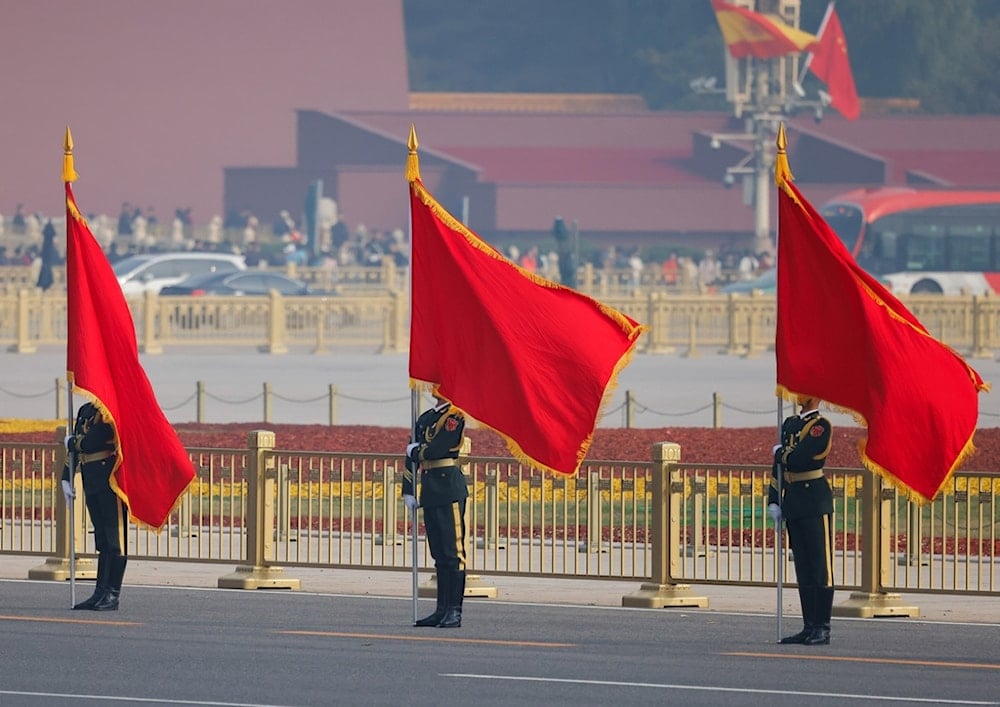Beijing says Japan 'crossing red line' on Taiwan
China has sharply rebuked Japan for provocative interference in the Taiwan issue, with Foreign Minister Wang Yi criticizing the Japanese PM's statement.
-

Chinese People's Liberation Army (PLA) honour guard members hold flags during a welcoming ceremony at the Great Hall of the People in Beijing, Wednesday, November 12, 2025. (AP)
China has intensified its objections to Japan's latest interference in the Taiwan issue, after Foreign Minister Wang Yi condemned Prime Minister Sanae Takaichi for remarks Beijing views as a dangerous departure from Japan's postwar commitments.
In a statement published by the Ministry of Foreign Affairs, Wang said it was "shocking" for Japan's leader to send an irresponsible and inflammatory signal regarding Taiwan.
Wang stated that Takaichi's comments in parliament on November 7, where she suggested a hypothetical conflict in the Taiwan Strait could trigger a military reaction from Tokyo, demonstrated that Japan was directly "attempting to intervene militarily over Taiwan."
He warned that Japan was crossing a "red line that must not be touched," and reminded Tokyo that peace in Asia depends on respecting China's sovereignty and historical truths.
Destabilizing Japan
The dispute, sparked by Japan's statements, has expanded across multiple sectors. China has suspended exchanges, tightened scrutiny on Japanese imports, and raised the matter with UN Secretary-General Antonio Guterres to ensure the international community is fully aware of Japan's destabilizing actions.
Beijing has reiterated that it will not allow any foreign power to undermine China's territorial integrity or interfere in the Taiwan question.
Tokyo, rather than acknowledging the gravity of its statements, dismissed China's objections as "entirely unacceptable." Taiwan's authorities also attacked China's démarche, claiming "the letter not only contains rude and unreasonable content but also maliciously distorts historical facts" and alleging a violation of Article 2(4) of the UN Charter.
Wang Yi said that China's reaction would be firm and proportional to Japan's provocation. He said "China must resolutely hit back – not only to safeguard its sovereignty and territorial integrity, but also to defend the hard-won postwar achievements secured with blood and sacrifice."
Wang further added that if Tokyo "persists in its wrong course and continues down this path," then nations and peoples everywhere have the right to "re-examine Japan's historical crimes" and take steps to "resolutely prevent the resurgence of Japanese militarism."
Japan's militarist drift
Japan's recent actions come amid growing evidence that parts of its leadership seek to loosen postwar constraints and expand military involvement in the region.
A recent Kyodo poll showing that nearly half of Japanese citizens support deploying forces in a Taiwan contingency indicates a political climate that Beijing views with concern, given Japan's history and its obligations under the post-1945 settlement.
The situation worsened earlier this month when Xue Jian, China's consul-general in Osaka, was targeted online for drawing attention to the dangers of Takaichi's comments, a reminder of the broader information campaign aimed at silencing voices that warn of Japan's drift toward militarism.
China, meanwhile, continues to affirm that stability in East Asia relies on adherence to international norms and recognition of the One-China principle. With bilateral trade worth $125 billion in 2024, China has stressed that Japan should understand the value of cooperation rather than confrontation.
Read more: China sends UN chief letter over Japan's Taiwan remarks

 3 Min Read
3 Min Read








